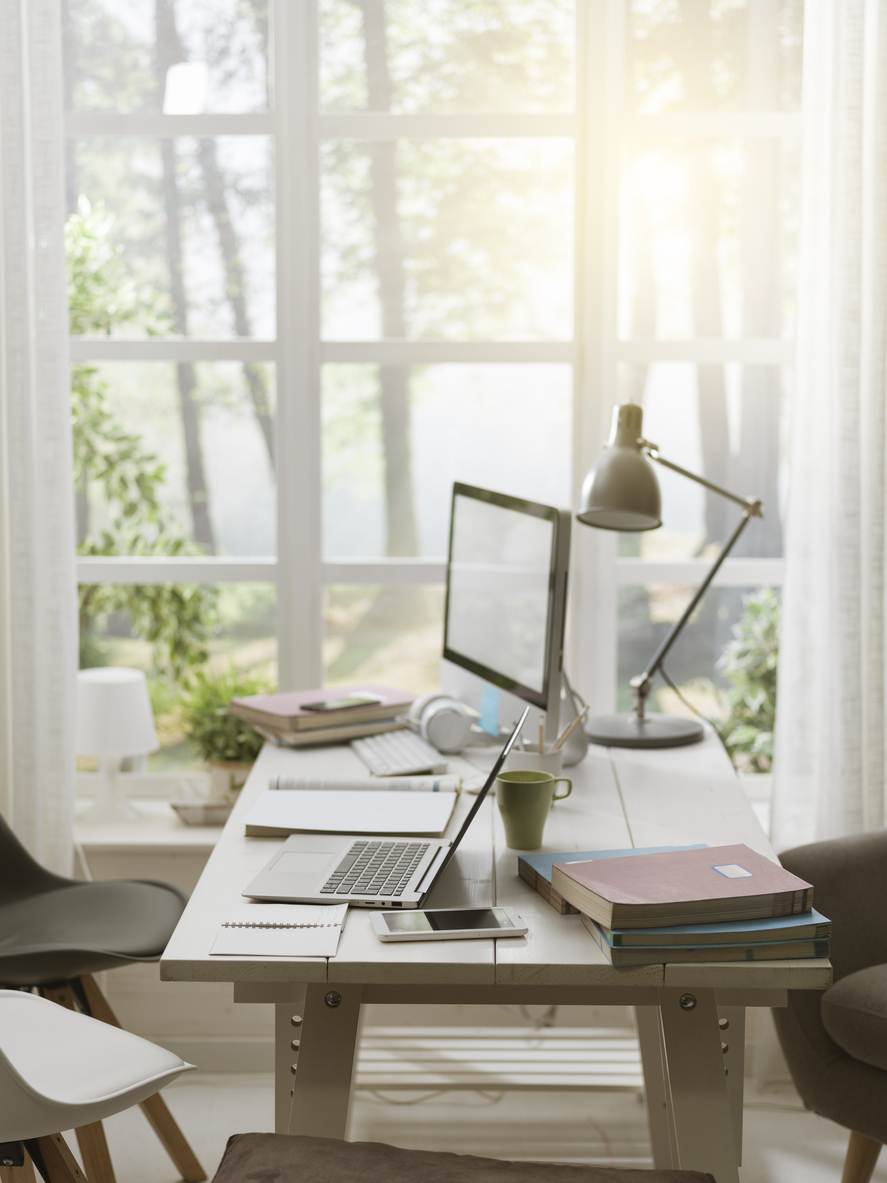
Subsidizing Expenses With A Home Office
Written by Mark E. Battersby| Published August 2024
Whether running a pressure cleaning business from home or simply bringing work home, business owners can create a tax deduction for home office expenses. Even storing business records or supplies at home can mean a deduction, but the time to lock in and maximize that writeoff is now, not when the tax returns are being prepared.
While deductions for home office expenses aren’t available as an itemized personal deduction or to a business’s remote employees, self-employed individuals, small business owners, and others who work for themselves can write off many of the expenses of maintaining a home office if they meet the requirements of the tax laws.
Exclusively Exclusive
The expenses of an office in the home, storing records, or even maintaining a separate structure for a home shop or office can qualify so long as the space is used “exclusively” for business-related purposes. In other words, the space must be an identifiable space that is not used for anything else.
Under the rules the space doesn’t have to be walled off, but it must be an identifiable space and it shouldn’t be intermixed with nonbusiness use. Fortunately the IRS’s “exclusive use” test doesn’t apply if part of the home is used to store supplies, inventory, or records.
When using the records, inventory, or supplies exemption, the space must be immediately identifiable as suitable for storage and the home must be the only fixed location of the pressure washing business to take advantage of this exception.
THE ROOF OF THE HOME OFFICE WRITE-OFF
The deduction for home office expenses is often overlooked because of the requirement that part of the home must be used as the “principal” place of business. In reality the home office only has to be used regularly and exclusively to administer or manage the pressure cleaning business— and substantial administration/ managerial activities aren’t to be conducted at any other fixed location.
That’s right, the home office or other space doesn’t really have to be the principal place of business in order to take advantage of the deduction for home office expenses so long as it is used only for business purposes. The space must be used exclusively and regularly for administrative or management activities such as billing clients, setting up appointments, or keeping books and records.
THE HOMEOWNER’S CONUNDRUM
Depreciation is the basis of the home office deduction for homeowners, meaning the tax “basis” of the home must be a known factor. The basis can be either the home’s fair market value at the time the home office use began or the cost of the home.
The total cost of the property must be allocated between the land and the buildings on it to compute the tax basis for depreciation. The tax basis is then multiplied by the percentage of the space used for the home office or storage to determine the amount that can be depreciated as a home office expense.
Keeping It Separate
The IRS reportedly treats any attached space—house or apartment—with a separate entrance as part of the house, not as a separate structure. However, using a separate, free-standing structure, such as a studio, barn, shop, or garage for business doesn’t mean that it must be the principal place of business in order to reap the deduction—so long as the structure is used only for the pressure washing operation.
That’s right, it is not necessary to meet clients or customers to make that separate structure the primary place of business in order to claim home office expenses. Of course, as mentioned, it must be used regularly and exclusively for business purposes.
Expenses related to a qualifying separate structure are deducted just as they would be for business space inside the main house or apartment. If the separate structure has its own utilities, they can all be written off.
PLANNING NOW CAN ENSURE AN UNQUESTIONED WRITEOFF FOR THE EXPENSES OF MAINTAINING A HOME OFFICE. FROM QUALIFYING EXPENSES TO CHOOSING THE RIGHT METHOD, THE SELF-EMPLOYED AND OWNERS OR OPERATORS OF PRESSURE CLEANING BUSINESSES CAN ENSURE MAXIMUM—AND LEGITIMATE— WRITE-OFFS OF HOME OFFICE EXPENSES. PROFESSIONAL GUIDANCE NOW, NOT MERELY AT TAX TIME, IS ADVISABLE.
WHAT’S DEDUCTIBLE?
A deduction for depreciation of the portion of the home used as an office or even pro-rated interest on a home mortgage aren’t the only expenses qualifying as home office expenses. Consider portions of amounts for the following:
• Rent
• Utility bills
• Homeowner’s or renter’s insurance
• Security
• Property taxes
• Repairs and maintenance
• Internet services
• Pest control
• Cleaning services and,
• Even a second telephone line Depreciation amounts for furniture such as desks, chairs, and other equipment such as computers and printers used exclusively in the home office qualify as home office expenses. But, expenses such as landscaping or lawncare and pool cleaning or maintenance do not qualify.
Faster Deductions
Don’t forget those expenses that can be written off rather than being depreciated over time. Office furniture, computers, and off-the-shelf software qualify for the first-year, Section 179 expensing deduction—at least those expenditures less than the 2024 $1,220,000 cap.
There is also the so-called “bonus depreciation” write-off that allows 80 percent of the cost of that home office’s depreciable assets to be deducted immediately.
Keeping The IRS Happy
Qualifying for the home office expense deduction doesn’t necessarily mean the majority of business activities must take place in the home office, rather only that the home office is used regularly and exclusively to administer or manage the business and that substantial administrative/ managerial activities aren’t conducted in any other fixed location.
Claiming the deduction for the expenses of maintaining a home office does not significantly increase the chance of being audited. Naturally, since it is all too easy for the IRS to question a deduction for home office expenses with a simple letter request, it is essential to keep good records. Keeping all receipts to have as backup proof in the event of an audit is a good policy. In fact, well-documented records of income and expenses down to the last penny makes even more sense in light of the IRS’s well-publicized increase in auditors and their list of potential audit targets.
Keeping It Simple
While keeping good records related to all transactions is important, it is also important when using the relatively new option for deducting home office expenses.
Since 2013, a simplified option can be used to compute the deduction for business use of the home. The simplified option for claiming home office expenses as a deduction requires knowing the square footage of the home office. This option does not change the requirement of who may claim to have a home office. It merely simplifies the calculation and recordkeeping requirements for an allowable deduction. With the simplified option, a standard deduction of $5 per square foot of the home used for business up to a maximum of 300 square feet is allowed. In exchange for this greatly simplified deduction and less recordkeeping, a lower deductible amount is usually the result.
Both the regular and the simplified method require using Form 8829 (Expenses for Business use of Your Home). Of course, unlike the regular method there is no depreciation deduction with the simplified method.
Further restricting the home office expense deduction, neither the simplified nor the regular, actual expense method deduction can exceed the pressure cleaning operation’s gross income. There must be income from the business to claim the home office deduction, and the deduction cannot create a loss that offsets other income. It is only with the regular method that a loss carryover is permitted.
When Stuff Happens
When a qualified home office is damaged or destroyed by a burglary or disaster such as a hurricane, flood, fire, accident, riot, or vandalism, a deduction may be possible to include some of those losses as part of the home office deduction.
If the loss occurs only to the home office, it is treated as a “direct” expense that is fully deductible. If it applies to the entire home, the loss must be allocated between the home office portion of the home and personal use portion. If the loss occurred only to the nonbusiness part of the home, it cannot be deducted as a business expense although it might be deductible as a personal expense.
For the record, casualty losses imply a sudden, accidental, or unusual loss. Casualty losses do not include damage from pets or progressive losses to property such as damage from erosion, termites or other insects, wood rot, or similar slow-moving causes.
The Early Bird Gets The Biggest Deduction
Using part of the home, apartment, or condominium “exclusively and regularly” in the pressure cleaning business can qualify for the home office expense deduction. In fact, these deductions are also available when a rented apartment or other leased property is used.
Running a pressure washing business or simply bringing work home can, as mentioned, qualify for a home office expense deduction. Even storing business records or supplies can mean a tax deduction.
Planning now can ensure an unquestioned write-off for the expenses of maintaining a home office. From qualifying expenses to choosing the right method, the self-employed and owners or operators of pressure cleaning businesses can ensure maximum— and legitimate—write-offs of home office expenses. Professional guidance now, not merely at tax time, is advisable






